![Rhodes Scholar, 84 Muir [Hostel?] Allahabad, January 23.](https://marginalisedhistories.magd.ox.ac.uk/wp-content/uploads/2022/06/kumar-file02527-815x1024.jpg)
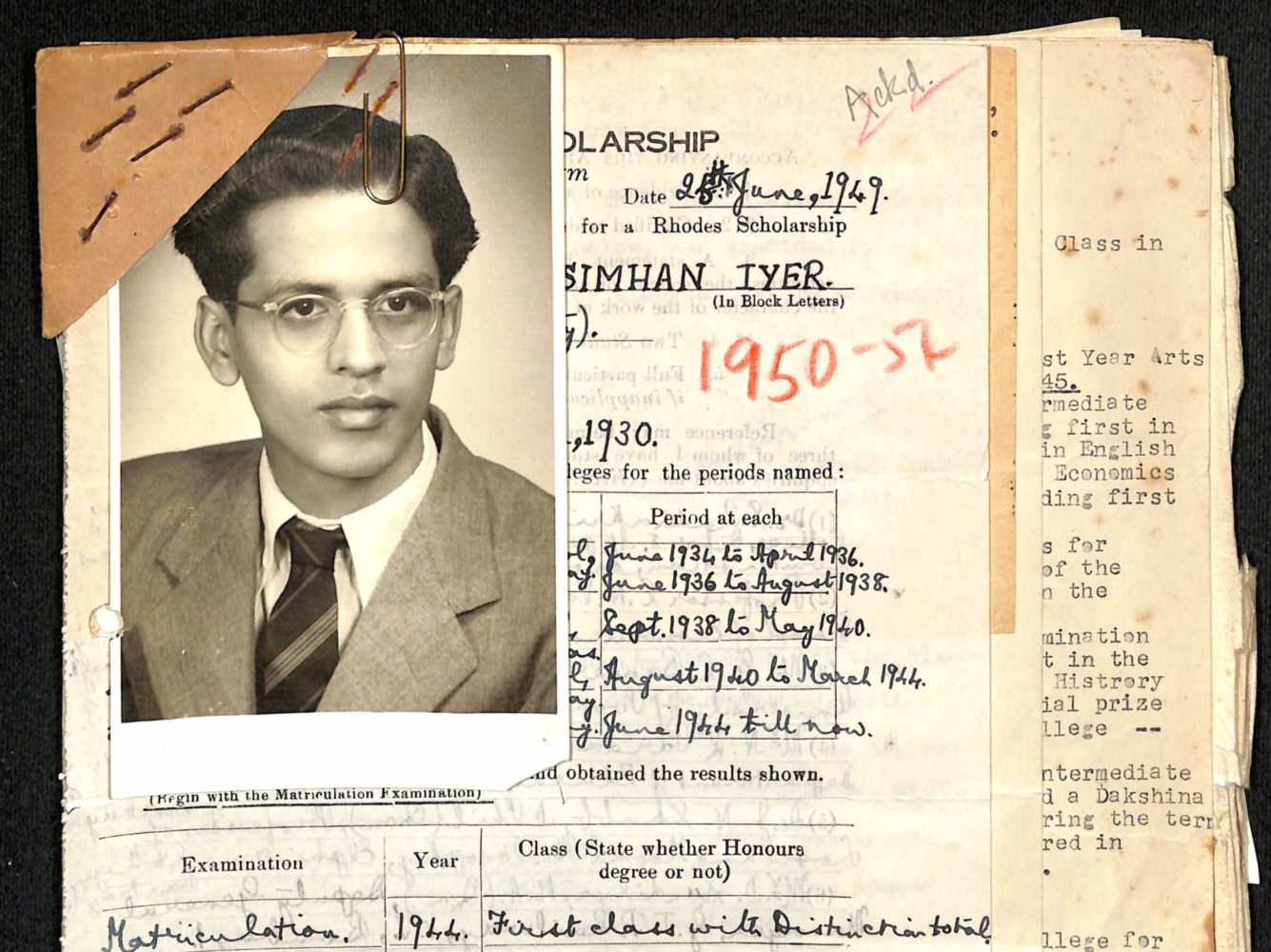

The Second World War was a turning point for Magdalen. Change was noticed by students and fellows alike.
In the words of Cecil Hourani, the interwar years were ‘the last era of this luxury’. He recalled that students before the Second World War had benefited from warm rooms heated by roaring fires, morning coffee served to them in bed, and silver service for dinner parties in their rooms, all supplied by their personal male servant or ‘Scout’. Hourani remembered that ‘I did come back after the War, for one night or two, and I remember freezing in the rooms. There was an electric heater and it did not at all provide the same comfort as I had enjoyed here.’
In these straitened times, a couple of international students of colour joined Magdalen most years. Most of these men came from across the Commonwealth, principally South Asia or the Middle East. In contrast to the 1920s and 1930s, many more benefited from academic scholarships. In an era of social democracy, the opportunity to study at Oxford was offered to more students who could not rely on elite family connections, within Britain and across the Commonwealth.
There are few signs, however, that the dominant culture within College responded to the handful of people who brought diverse cultures and heritages to Magdalen. Even when men were active and influential pioneers before and after their Oxford years, the archives contain few clues as to their experiences and identities within Magdalen. How should we interpret this absence?
![Rhodes Scholar, 84 Muir [Hostel?] Allahabad, January 23.](https://marginalisedhistories.magd.ox.ac.uk/wp-content/uploads/2022/06/kumar-file02527-815x1024.jpg)
![Rhodes Scholar, 84 Muir [Hostel?] Allahabad, January 23.](https://marginalisedhistories.magd.ox.ac.uk/wp-content/uploads/2022/06/kumar-file02527-815x1024.jpg)
Lovraj Kumar student file: letter requesting admission to Magdalen, 23 January 1947
Lovraj Kumar came to Magdalen in 1947 as one of the first two Rhodes Scholars from India. He had studied at an elite Indian boarding school and the University of Allahabad, and here you can see his confident application letter.
1947 was also the year that India gained its independence from the British Empire. Rhodes scholarships to study at Oxford University had been established through the will of Cecil Rhodes in 1902, but had previously only been awarded to ‘young Colonists’, Americans, and Germans. After the Second World War, the University of Oxford’s institutions, including Magdalen and the Rhodes Trust, could no longer ignore global movements for equal rights and against colonial power.
A patchwork of scholarship schemes ensured that many more students from across the globe made their Oxford home at Magdalen. In the late-1940s, this included all three ‘Palestine Government Scholars’ studying at Oxford, perhaps enabled by Albert Hourani’s work in the Arab Office. The first, Edmond Asfur, came to Magdalen in 1946 with a £400 per year scholarship.[13]
MCA: AD/14 L
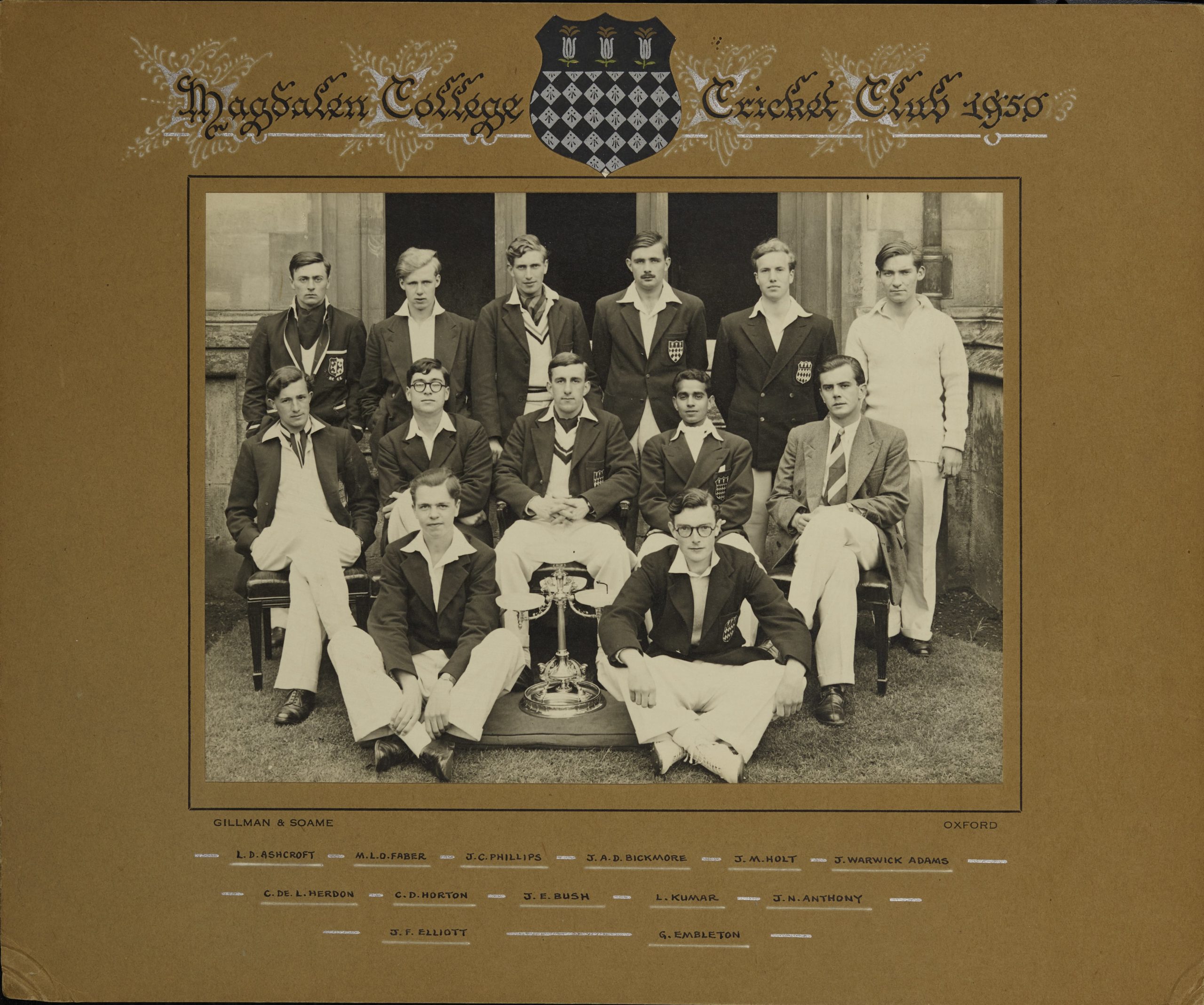
Lovraj Kumar
Lovraj Kumar in Magdalen College Cricket Club, 1950
Lovraj Kumar’s passion for sport makes his experiences at Magdalen unusually visible. In his application, he described how at school he had ‘played all the sports’, including representing his House ‘in Cricket, Hockey, Tennis, Boxing, Wrestling and Swimming’.
As well as playing cricket for Magdalen, Kumar played for the University of Oxford, becoming Vice-Captain and then Captain in 1946. He was awarded the Balling Prize ‘for having the best balling average for the season’. Kumar also graduated with a first-class degree in chemistry, but his academic work left fewer archival traces.
MCA: P423/P1/1
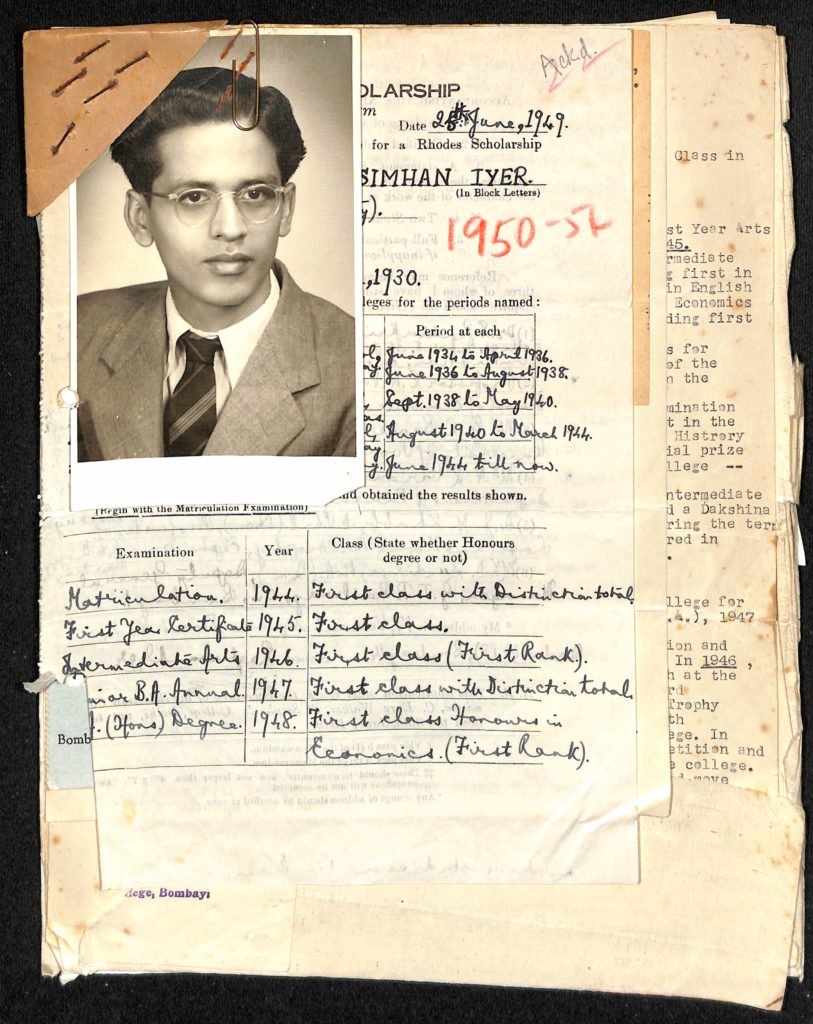

Raghavan N. Iyer, student file, 1950-1953
We gain richer insights into student experiences after the Second World War because Magdalen changed how it kept and stored its documents. College began to preserve files that made all of a student’s interactions with college officials into a formal record. Reams of correspondence were stapled together: a standardised application for admission, a photograph, accommodation arrangements, college bills, letters awarding prizes, and reports from tutors.
This bundle is the file of Raghavan N. Iyer. Iyer arrived as a Rhodes Scholar in 1950. He had studied at the University of Bombay, now Mumbai, from the age of fifteen, and had even begun teaching there, before coming to study Philosophy, Politics and Economics at Magdalen. He went on to become a professor of political science at the University of California, Santa Barbara, where his work brought together the philosophy and culture of ‘East’ and ‘West’.
MCA: AD/21
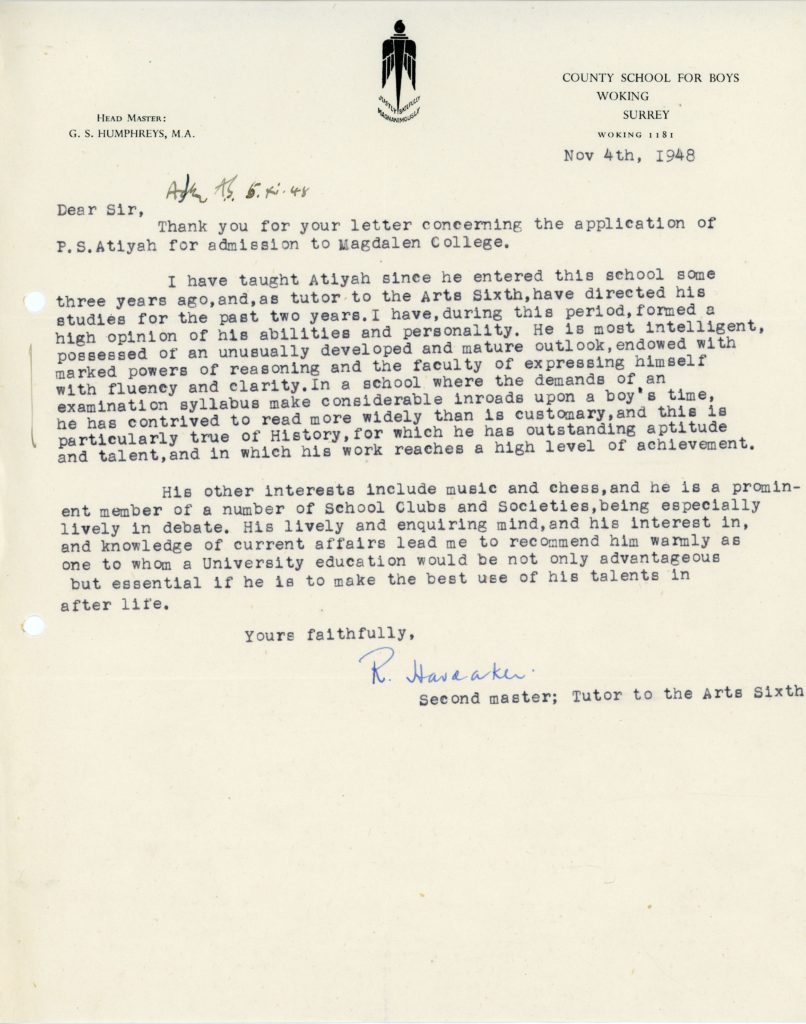

Patrick Selim Atiyah, student file, 1950-54: reference from County School for Boys, Woking, Surrey, 1948
Patrick Atiyah came to Magdalen to study Law in 1950, having been educated in Sudan, Egypt, and a Surrey grammar school. His mother was Scottish, while his father was Lebanese, and both had been educated at Oxford. This letter of reference formed part of his application. Atiyah excelled at Magdalen, winning numerous prizes and scholarships. Atiyah became an expert in the law of tort and contract, described as ‘one of the great legal scholars of the twentieth century’.[14]
MCA: AD/21
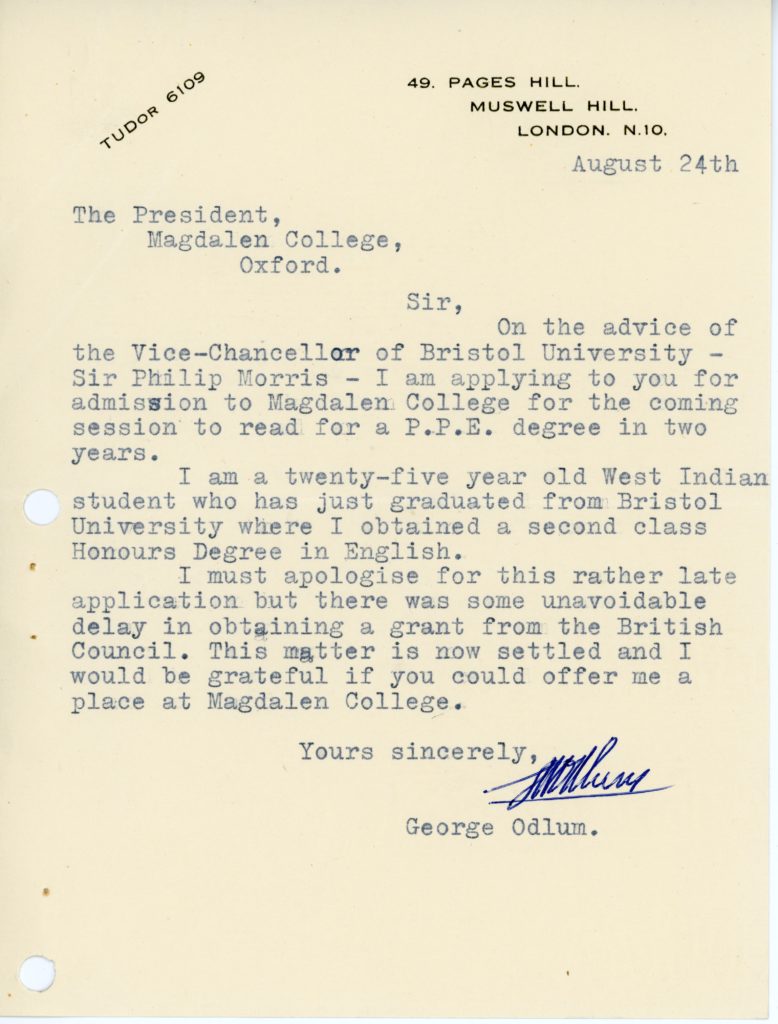

George Odlum student file: letter requesting admission to Magdalen, 24 August 1959
George Odlum was amongst the first generation of Black Caribbean students to study at Magdalen. He was born in St. Lucia, an island in the eastern Caribbean, then still within the British Empire. He came to Magdalen to study Philosophy, Politics and Economics in 1959, funded by a prestigious scholarship from the British Council, an organization founded in 1934 to promote closer international links.
This is Odlum’s modest letter of application, but he had had a path-breaking career while studying English at the University of Bristol. He is thought to have been the first Black president of a student union at a British university.
Odlum had been active within Bristol student life: an actor, a sportsman playing football and cricket, and a prominent debater, as well as student leader. Yet, within Oxford archives, there is a great deal of silence. There is no apparent record of him in the files of the College cricket, drama, or debating societies, nor any traces of him at the Oxford Union, the University debating society. Few records were kept by Magdalen’s graduate organisation, the Middle Common Room (MCR). It is impossible to know how Odlum experienced his two years at Magdalen or what role College played in his radicalisation and political consciousness.
MCA: AD/43
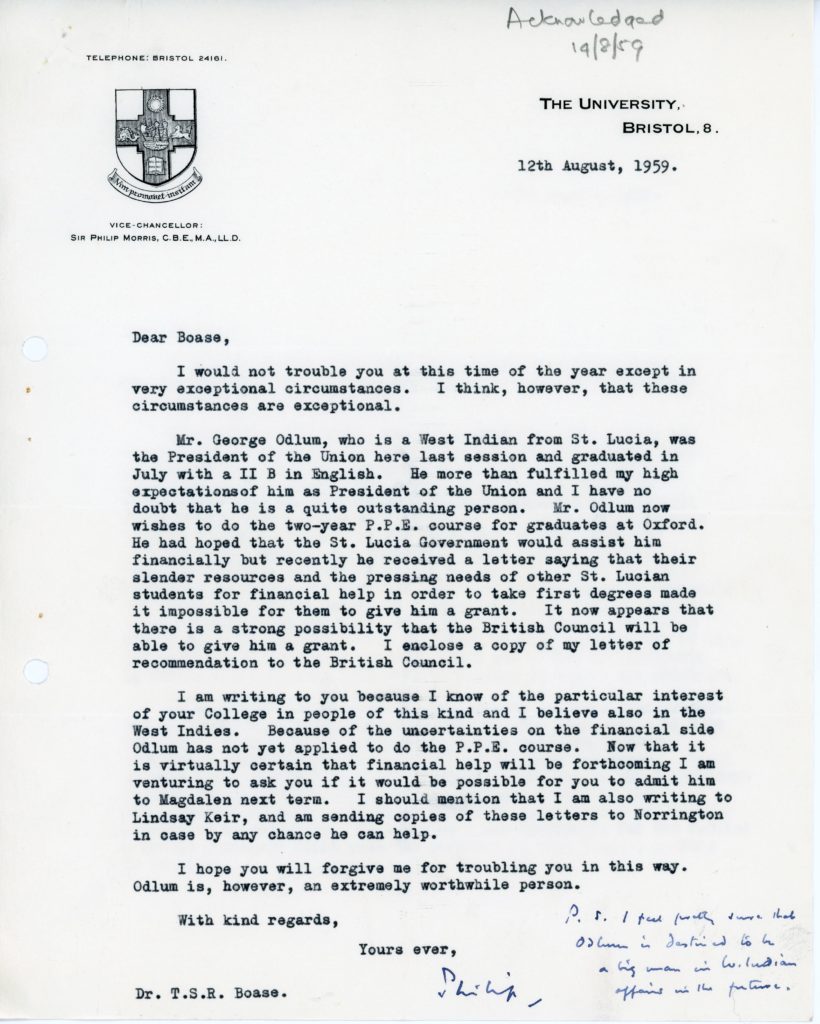

George Odlum student file: letter from Sir Philip Morris, Vice Chancellor of Bristol University, to President Thomas Boase of Magdalen, 12 August 1959
This letter from the Vice-Chancellor of the University of Bristol describes the ‘very exceptional circumstances’ in which the ‘outstanding’ George Odlum applied to Magdalen.
The Vice-Chancellor comments that ‘I know of the particular interest of your College in people of this kind and I believe also in the West Indies’. Odlum was not the first Black Caribbean student to study at Magdalen. In 1949 Frank Owen Abdulah had come to Magdalen from Trinidad to study French and Spanish. Abdulah went on to develop a distinguished career at the United Nations, including as Chairman of the UN’s Special Committee on Decolonization in the 1980s.
The handwritten postscript to the letter of recommendation was prescient: ‘I feel pretty sure that Odlum is destined to be a big man in W Indian affairs in the future.’ After leaving Magdalen, Odlum founded what became known from 1972 as the ‘St. Lucia Action Movement’. His activism created a vision of Black economic ownership and autonomous foreign policy that addressed the ‘racial and economic legacies of the colonial past’.[15] As a leader within St. Lucian left-wing and radical nationalist activism, Odlum’s political career was central to St. Lucian decolonisation, resulting in Independence in 1979.
MCA: AD/43
Letter from K.B. (Bruce) McFarlane to Helena Wright, 1948
In 1948 Bruce McFarlane, a forty-four-year-old medieval history fellow, wrote to his friend Helena Wright, a gynaecologist and birth control advocate. He reflected on the recent appointment of four fellows who during the Second World War had objected to military service, noting that ‘what with three other C.O.s [Conscientious Objectors] elected to the fellowship this year already, an Arab, a German and now a German Jew all in one year, the College is becoming almost excessively unorthodox. We only need a Chinese and an Indian to complete the transformation.’
McFarlane went on to gossip about the doubtful ‘nationality’ of other colleagues elected alongside Albert Hourani. Fellows with heritage from beyond Britain were the subject of suspicion, but the self-mocking tone also implies that Magdalen’s generational ‘transformation’ was at least partially welcomed by some.
Magdalen’s fellowship had become younger and the previous year the fellows had elected the forty-nine-year-old art historian Thomas Boase as President. Change was applauded by some within Magdalen as the college rebuilt itself in the shadow of the Second World War.
MCA: P27/C1/780
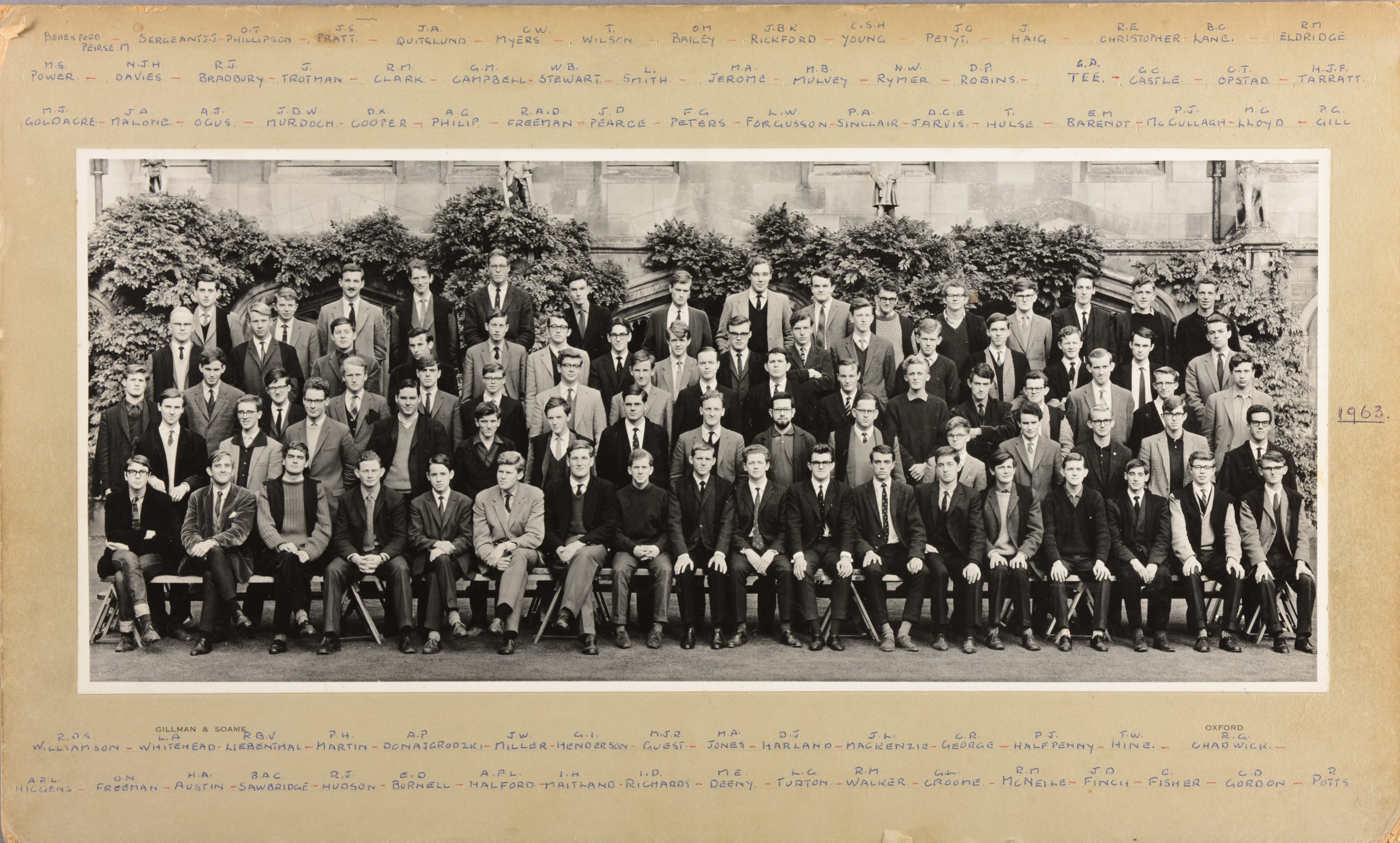
Matriculation photograph, 1963
All students who begin their studies at Oxford University take part in a matriculation ceremony that makes them members of the University. The new students also have an official college photograph. These photographs are preserved in the Magdalen archive, including this photo from 1963.
Stanley Sanders was admitted to Magdalen as a Rhodes Scholar in 1963. After a gap of 56 years in which no African-American men had been selected by the Rhodes Scholarship’s committees, Sanders was one of two Black students awarded the Scholarship. Sanders is, however, not in the matriculation photograph. The official archive misses a great deal of what happened in the past.
Sanders’ achievements were exceptional. He grew up in a poor district of Los Angeles, where his father was a refuse collector, and excelled both academically and in sport. He later looked back fondly on his time at Oxford, which he said offered him the freedom to read, socialise, and travel.[16] After Oxford and Yale, he developed a successful career as a lawyer and community leader in Los Angeles.
MCA: O2/1/P3/14